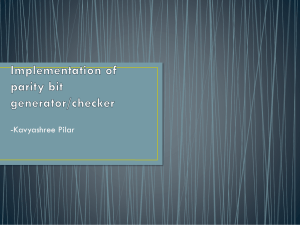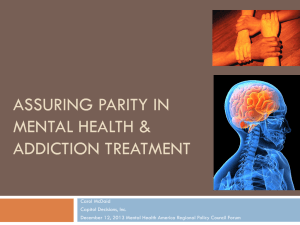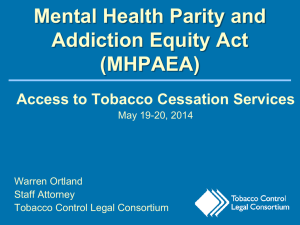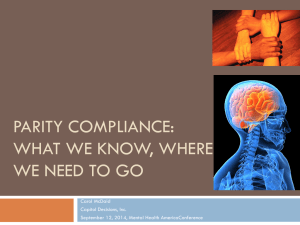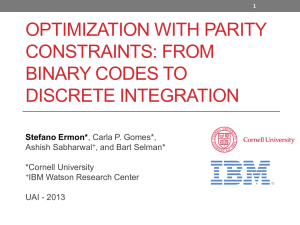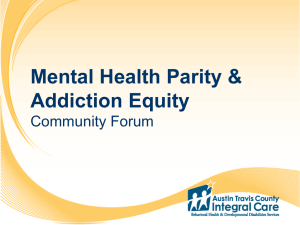Mental Health Services For Children
advertisement
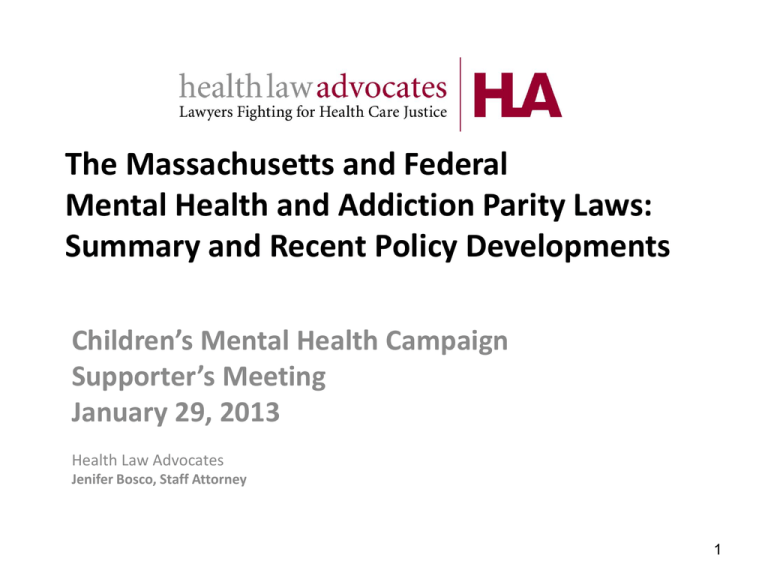
The Massachusetts and Federal Mental Health and Addiction Parity Laws: Summary and Recent Policy Developments Children’s Mental Health Campaign Supporter’s Meeting January 29, 2013 Health Law Advocates Jenifer Bosco, Staff Attorney 1 What is parity? In general, parity laws say that health insurance companies must cover mental health and substance use disorder (SUD) treatment in the same way that they cover treatment for physical health conditions. 2 Know Your Plan, Know Your Rights • Different parity laws apply, depending on what kind of health plan you have • “Fully insured” plans • “Self insured” or “self funded” plans • State and municipal employee plans 3 Who is covered by the Massachusetts Parity Law? • State parity law applies to: • All fully-insured group health plans • Non-group health plans • Fully-insured health plans delivered in Massachusetts or outside of Massachusetts • GIC (state government employee plans) • Does not apply to: • • • • • • Self-insured health plans Incarcerated persons, including youth in DYS custodial facilities Medicare MassHealth Veteran’s insurance through TRICARE Federal government employees 4 Who is covered by the Federal Parity Law? • Paul Wellstone and Pete Domenici Mental Health Parity and Addiction Equity Act of 2008 (MHPAEA) • MHPAEA applies to: • Self-insured AND fully-insured group health plans of employers with more than 50 employees (i.e. large group health plans) • Large group health plans that offer mental health or substance abuse benefits • State and local government employers • MassHealth managed care plans 5 Who is not covered by the Federal Parity Law? MHPAEA does not apply to: • Employers with 50 or fewer employees (note: this may change in 2014) • Federal government employees, or non-federal government employers that opt out • TRICARE • Medicare • Large group health plans that receive actuarial certification that compliance will increase claims by 2 percent 6 Types of plans/Parity laws Type of Health Plan Does Mass. Parity Law apply? Does Federal Parity Law (MHPAEA) apply? Self-insured with more than 50 employees No Yes Self-insured with 50 or fewer employees No No GIC (State employees) Yes Yes Fully-insured with more than 50 employees Yes Yes Fully-insured with 50 or fewer employees Yes No (may apply in 2014) Individual Yes Maybe (will apply in 2014) MassHealth No Yes (except fee-for-service) Medicare No No 7 Massachusetts Parity Law • Applies only in Massachusetts • Requires non-discriminatory coverage for diagnosis and treatment of certain biologically based conditions in adults • Non-Discriminatory: Annual or lifetime dollar or unit of service limitations on coverage for the diagnosis and treatment of certain biologically based mental illnesses may not be less than any such limitation imposed on coverage for diagnosis and treatment of physical conditions • Under the Affordable Care Act (“Obamacare”), no more lifetime limits and no unreasonable annual limits beginning in 2014 • Copayments, coinsurance and deductibles cannot be greater for mental disorders than for physical conditions. 8 Biologically Based Mental Illnesses That Must Have Non-Discriminatory Coverage • • • • • • • • • Schizophrenia Schizoaffective disorder Major depressive disorder Bipolar disorder Paranoia and other psychotic disorders Obsessive-compulsive disorder Panic Disorder Delirium and dementia Affective disorder • • • • Eating Disorders* PTSD* Substance Abuse Disorders* Autism* • Also, Rape-related mental or emotional disorders to victims * Added in 2008 9 What about conditions that are not on the list? • Minimum = 60 days of inpatient treatment and 24 outpatient visits per year for the diagnosis and treatment of all other mental disorders described in the most recent edition of the DSM • Federal laws may require additional visits and inpatient treatment days 10 What types of care? • Requires that a full scope of services must be covered: inpatient, outpatient and intermediate care • Intermediate care includes residential programs, in-home therapy, partial hospitalization, etc. 11 Children and Adolescents • Mandates non-discriminatory coverage for children and adolescents for diagnosis and treatment for additional disorders • Additional disorders: Conditions listed in the most recent DSM that substantially interfere with or substantially limit child’s functioning and social interactions 12 Federal Parity Law: the Mental Health Parity and Addiction Equity Act • No “mandated benefit” • Non-discriminatory financial requirements in coverage for mental health and substance use disorder care • Non-discriminatory treatment limitations in coverage for mental health and substance use disorder care • Availability of certain information on health plan coverage determinations • Non-discriminatory access to out-of-network providers 13 What are “nonquantitative treatment limitations”? Under the federal parity law, it is illegal for health plans to discriminate in: • Medical management standards (e.g., techniques for managing care such as prior authorization, concurrent review and utilization review policies) • Standards for provider admission to join a network, including reimbursement rates • Formulary design for prescription drugs • Fail-first policies • Exclusions based on failure to complete a course of treatment 14 Example Kim had to go to the hospital to have her appendix removed, and her health plan covered her three-day hospital stay. Four months later, Kim sought inpatient hospitalization for her bipolar disorder. The health plan first required “prior authorization,” and then approved only one day in the hospital. Does this violate the state parity law? The federal parity law? 15 Availability of information on health plan coverage determinations Medical Necessity: Health plans are still allowed to decide if care is medically necessary Criteria: Health plans must make available the criteria used for medical necessity determinations for mental health or substance use disorder benefits Reason for denial: Health plans must provide enrollees with the reason for any denial of coverage for mental health or substance use disorder care 16 17 18 19 20 Etc… More UBH “Level of Care” Guidelines at: https://www.ubhonline.com/html/guidelin es/levelOfCareGuidelines/ 21 Next Steps after a denial: • Internal Review • External Review • Office of Patient Protection • Self-Insured plans • ERISA litigation • State and Federal agency enforcement • U.S. Department of Labor, Employee Benefit Security Administration • U.S. Health and Human Services Department • Massachusetts Division of Insurance 22 External Review, general practices • Review written denial from health plan, criteria, and the supporting evidence • Obtain a copy of the file from the health plan • Point out any evidence that was ignored, or where the decision was contrary to the evidence on file • Submit any additional supporting documents or letters from providers 23 Recent Massachusetts policy developments • 2012 Payment Reform Law (Ch. 224, Sections 23, 254, 265, 275) gives DOI the authority to enforce the federal parity law for some plans • New annual reporting requirements • DOI and MassHealth directed to create parity regulations • Behavioral Health Task Force created • Creation of HPC, which will now operate OPP 24 Recent federal policy developments Medicaid • January 16 CMS State Director letter • Medicaid managed care plans must comply with parity, including non-quantitative treatment limitations Private Insurance • Administration says final MHPAEA regulations will be released soon, possibly spring of 2013 25 Resources: Government Enforcement • United States Department of Labor, Employee Benefits Security Administration at 1-866-444-3272 or www.askebsa.dol.gov • United States Department of Health and Human Services at 1-877-267-2323 extension 6-1565 or at phig@cms.hhs.gov • Office for Patient Protection at 1-800-436-7757 • Massachusetts Division of Insurance at 888-283-3757 26 More information: • Parity laws and other resources posted at http://www.healthlawadvocates.org http://marylandparity.org/ http://www.dol.gov/ebsa/mentalhealthparity/ • Mental Health/Substance Use Treatment Toolkit and other information at parityispersonal.org • Health Law Advocates: 617-338-5241 • Health Care For All: 800-272-4232 27
